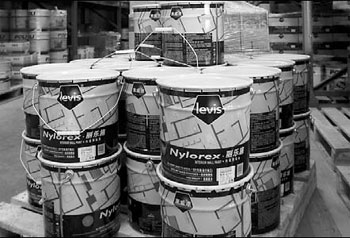

For Anders Brostrom, president of Akzo Nobel China, the most important work for him this year isn't pushing decorative paint or industrial coatings but integrating the two separate brands.
Last year the Amsterdam-based company acquired Imperial Chemical Industries (ICI), the British chemicals producer for 11.5 billion euros ($18.36 billion), which strongly enhanced Akzo Nobel's portfolio in the industrial coatings area.
After the deal Akzo Nobel became not only the largest industrial coatings manufacturer in the world, but also the number one in decorative paints. The company now is also a major worldwide supplier of specialty chemicals.

"The ICI deal also made us number one in China in coatings business with no challenge," says Brostrom. "This year we will further integrate the two companies' businesses in the country to achieve faster growth."
The integration with ICI in China covers a wide range, with brand integration a major one, says Brostrom.
In China ICI is one of the leading decorative paint producers, and its brand, Dulux, is one of the best well-known names in the market.
However, though Akzo Nobel is a stronger force in the industrial coatings field, its brand names as well as the corporate brand itself, are not as publicly well known.
"With this big ICI deal we will start some campaigns this year to further promote our corporate brand in China," says Brostrom, without disclosing further details.
Chinese market
Akzo Nobel's China operations reported revenue of $1.03 billion last year, an increase of 16 percent. In 2007 the company's revenue worldwide was 10.2 billion euros ($16.2 billion).
Last year the company announced new strategic targets for the Chinese market, which is expected to achieve revenues totaling $2 billion by 2012.
"We have revised our sales target for China a number of times in recent years, which reflects our confidence in the market. The integration with ICI will bring a lot of mileage to achieve this," says Brostrom.
In 2007 the company opened a polysulfide production plant in Taixing of Jiangsu province to further increase its manufacturing capacity in the fastest growing polysulfide market. Last year it also opened a decorative paint site in Langfang in Hebei, and a powder coatings plant in Chengdu.
The company now is spending 250 million euros ($398.3 million) on building two chemicals plant in Ningbo in Zhejiang province. The two new facilities, for the manufacture of chelating agents and ethylene amines, will be the one of the biggest sites for the company in the world.
The chelating agents plant is expected to start up in 2009, followed by the ethylene amines factory in early 2010.
"We have chosen Ningbo for these investments because the location is just south of Shanghai and its excellent transportation will enable us to supply the growing needs of our customers in China and the entire Asia Pacific region," says Brostrom.
Talking about development strategy in China, Brostrom says organic growth and merges and acquisitions (M&A) are equally important. But now the company is paying more attention on organic growth.
The company has done very little M&A in China, but it will look at future investment opportunities, he says.
Take China's coating industry for example. Currently there are many small coatings manufacturers. The sector will see some consolidations in the next few years.
"We will take advantage of this for better development in the country," says Brostrom.
Eco-efficient products
With energy saving and environmental protection a pressing issue, Akzo Nobel is also paying increasingly attention to its eco-efficient products. According to its sustainability report 2007, 18 percent of the turnover of the company's products contributed to more eco-efficient solutions.
The company has a goal to increase the share of products contributing to eco-efficient solutions to at least 30 percent of turnover in 2015.
The company's anti-fouling coatings products for example, they can increase the fuel efficiency of marine vessels by preventing organisms such as barnacles and weeds building up on the hull.
According to the company's statistics, without the products fuel consumption could increase by up to 40 percent due to the increased drag.
Industry insiders estimated that the use of antifouling coatings can save the shipping industry around $30 billion and reduces emission levels to 384 million tons and 3.6 million tons for CO2 and SO2 respectively.
(China Daily 04/28/2008 page5)













